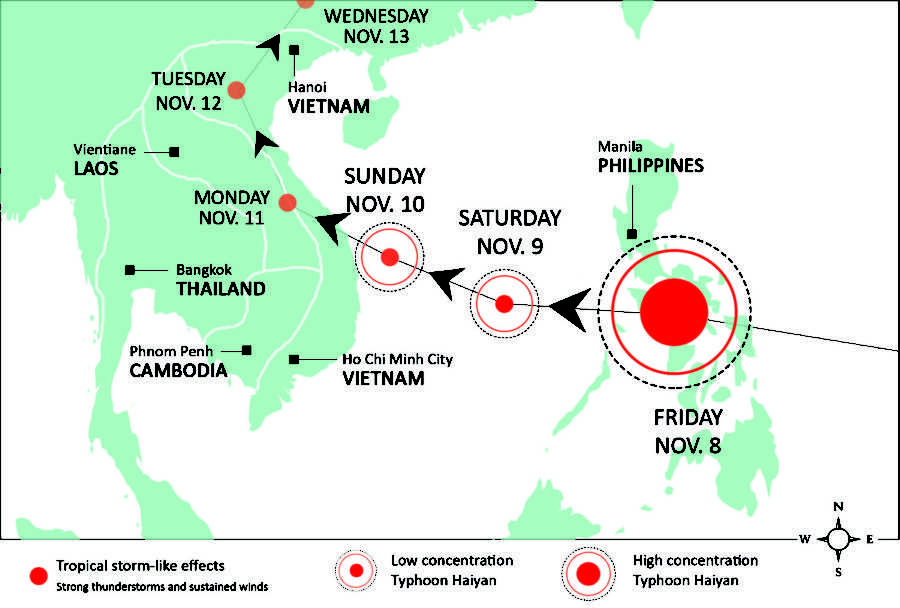Filipinos at ISU express worry for families, work to help homecountry
Graphic: Azwan Azhar/ Iowa State Daily
On Nov. 9, Typhoon Haiyan blew through the Philippines and affected many. This map shows the direction of the storm as it gradually dispersed and traveled to the northwest.
November 13, 2013
For two long days, she wasn’t able to sleep. Darlene Sanchez, graduate assistant in agronomy, was left wondering if her family had survived Typhoon Haiyan’s attack on the Philippines.
“I didn’t know if my parents on the Philippines were still alive or if they were dead,” Sanchez said. “There was no way to reach them. … I constantly monitored Facebook and Twitter for news, always afraid that I would find my mother and my father there.”
Sanchez’s parents live in one of the areas of the Philippines that were hit by the typhoon Friday. Because of power outages, they weren’t able to communicate they were alive and well with Sanchez.
“They told me that they were out of town when the typhoon hit our house,” Sanchez said. “Fortunately, our roof was just partially destroyed, so we had a lot of luck.”
In the following two days, Sanchez’s parents couldn’t get a phone signal, so they had to drive all the way out to the seashore to finally tell their daughter that everything was all right.
ISU Filipino students and faculty members said they were shocked when they heard the news of the typhoon devastating their home country.
“When I first heard about it on the news, I thought it wasn’t that big a deal, since typhoons happen on the Philippines quite regularly,” said Shanna Tan, freshman in food science. “As I read more and more, I realized what kind of disaster we were actually dealing with.”
Tan immediately contacted her family. Fortunately, she said, they live far enough away from the affected areas.
“I have a lot of friends though, who still haven’t been able to contact their families,” Tan said. “I’ve seen the pictures. It is terrible. There is debris everywhere; bodies lie on the streets. The situation is war-like. It’s survival of the fittest, the government does what it can, but it’s by far not enough.”
Eugenio Matibag, professor in world languages and culture and president of the ISU Filipino Association, said the current situation in the affected areas is catastrophic.
“People don’t have access to clean water, because it’s contaminated by putrefying corpses,” Matibag said. “Most of them don’t even have the basic means to survive, so they resort to looting relief vehicles — they are that desperate.”
The ISU Filipino association is currently planning out strategies to help out their fellow countrymen in need.
They put together boxes with clothing, shoes, blankets and other nonperishable items to send to the Philippines.
“Let’s face it, though: Whatever we do right now, it’s too little, and it’s too late,” Matibag said. “The people need what’s necessary to survive and they need it now.”
Matibag said he has a strong personal connection to the Philippines, since it’s the country where he was born.
“Filipinos all over the world see the country as their ancestral homeland,” Matibag said. “It’s a very diverse country, but we all feel like a national community and want to do everything we can to help.”
Maria-Nera Davis, clerk in computer science, has family in the Philippines, but they were safe from the typhoon. She said she is still saddened by the tragedy.
“I am a Filipino myself, so it is heartbreaking to see the pictures of the people and their losses,” Davis said. “I can’t even look at them any more, I immediately start crying, because I always imagine it could have been my relatives.”
Davis’s brothers and sister live in the southern part of the Philippines, so they weren’t affected.
“Me and my family, we all basically grew up with typhoons, but we’ve never witnessed a disaster of these proportions,” Davis said.
Davis said she’d rather see her house robbed than ever have to see so many of her countrymen die in a catastrophe like this again.
Matibag said he encourages students at Iowa State to donate money to help the victims of the catastrophe. He recommends relief agencies like Oxfam and World Vision International.
“We all need help now,” Sanchez said. “We really need all the help we can get to recover from this tragedy.”







